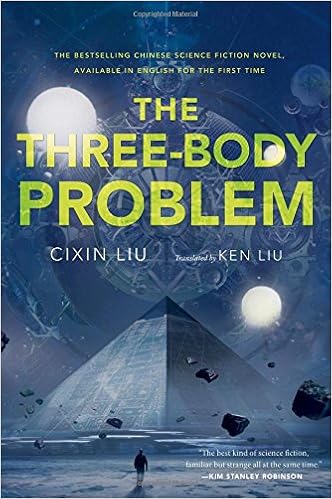written by David Steffen
 Less than a month ago, just before the Hugo Award voting deadline, I gave a preliminary review of the first 100 pages or so of the Hugo-nominated novel The Three Body Problem. I gave the partial review then to get it published before the Hugo deadline, but since then I’ve finished reading. This review will be pretty brief because I don’t want to spoil everything, and the truth about what exactly explains the weirdness that’s happened so far in the book takes a while to unroll.
Less than a month ago, just before the Hugo Award voting deadline, I gave a preliminary review of the first 100 pages or so of the Hugo-nominated novel The Three Body Problem. I gave the partial review then to get it published before the Hugo deadline, but since then I’ve finished reading. This review will be pretty brief because I don’t want to spoil everything, and the truth about what exactly explains the weirdness that’s happened so far in the book takes a while to unroll.
As mentioned in the partial review, I thought the beginning was much too slow, going into a lot of background detail on a character who was important to the story but didn’t end up being the main point of view character.
I continued to especially enjoy the in-book game titled The Three Body Problem in it’s weird representation of a world with chaotic seasons, and generally found those sections more compelling than the other parts of the book. The book in general is more distantly told than I prefer, often with the POV character bringing up a topic that he said he’d been planning with no prior note about it. I’m not sure how much of that is a language or cultural difference in the expectations of storytelling but I was interested enough to keep reading.
I guess I hadn’t paid enough attention and hadn’t realized that this was book one of three until it ended. Some things are resolved by the end of the book, but I wouldn’t call it a real complete story arc on its own–its very much a Part One, not a standalone story. Without getting into spoilery specifics, I thought the tension kind of ramped down near the end, so I’m not really sure how that’s going to carry over into the next book.
I enjoyed reading the book, finding out what was behind the weird occurrences, and finding out more about the in-book game. But with the generally slow and uneven pacing the ramp-down in tension near the end I’m not sure I’m into it enough to want to keep reading books two and three.
